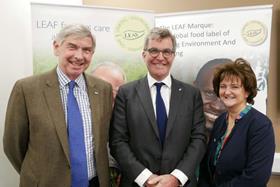
New LEAF Marque chairman Tom Green is aiming to grow their farming standards into a global benchmark for quality after Brexit.
Green officially took up the role of chairman of the farming organisation on their 15th anniversary at a gathering in the House of Commons, during which the group unveiled their new arm LEAF Education.
LEAF Education continues the outreach work of FACE (Farming and Countryside Education) after they merged in June last year and will provide open farm days for children and educational work on sustainable farming.
Speaking at the event, Green said: “Brexit requires Britain to take a leading role in farming. Consumer awareness and demand for more sustainably produced food is at an all-time high, demonstrating the need for an assurance system such as LEAF Marque. It provides businesses with an opportunity to promote their commitment to environmental sustainability.
“Our ambition is to turn up the volume on the great work that has already been done and to shine a light on what LEAF Marque means for all the key parts of the food supply chain – from farmers, through brands and retailers and UK consumers. Here’s to the next 15 years.”
In total, there are currently 1,032 LEAF Marque-certified businesses operating across the globe. Farmers with the certification implement sustainability practices in the field, supporting wildlife and the environment.
Around 36 per cent of fruit and vegetables produced in the UK are now grown to LEAF Marque standards, which also operates in 34 other countries.
Speaking on the launch of LEAF Education, Defra minister George Eustice said: “LEAF Education is a fantastic initiative to bring the work farmers do into the classroom and help inspire a new generation to the potential of a career in agriculture.
“People are increasingly interested in the food they eat, where it comes from and how it is produced. By opening the eyes of young people in schools to the world of farming, we can educate the next generation on the importance of sustainable, high-welfare and high-yield food production.”






No comments yet